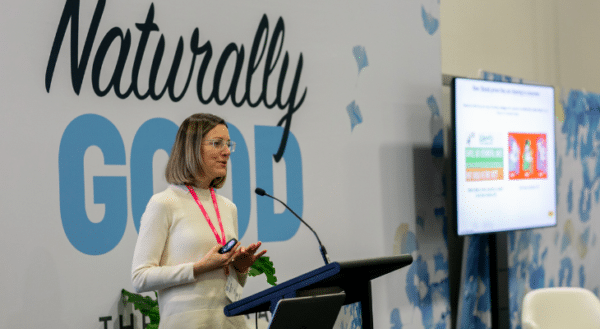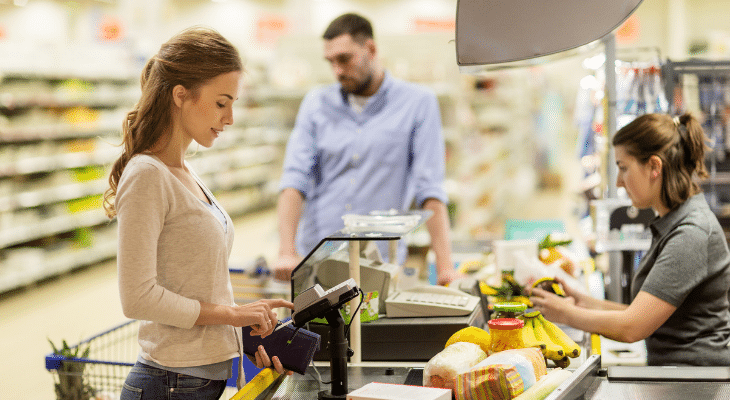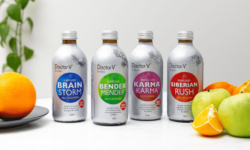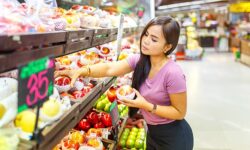Food & Drink Trends – Opportunities and Actions
Hear what was discussed and more in our Naturally Good 2021 panel discussion. If you missed the session or would like a recap, check out our key takeaways below!
The events of 2020 caused a fundamental reset in human behaviour – particularly in relation to food and drink trends.
As a result, companies in this space are now striving to create mental and emotional wellbeing solutions, deliver on new value needs, and use brands to celebrate people’s identities.
Senior Consultant Adriana Heinzen from global research group Mintel explored the rapidly changing 2021 Global Food and Drink Trends in her recent presentation at Naturally Good Expo 2021, highlighting some key points.

Pictured: Adriana Heinzen, Trend & Innovation Consultant, Mintel
Changes to consumer buying as a result of COVID-19
The health risks from COVID-19 and existing poor health conditions have prompted consumers to eat more nutritious diets. “The health associations of natural and organic foods will make them more important than ever during a global health pandemic,” she said.
“Still, the impact to the economy may cause fringe users who buy organic only occasionally or only in certain categories to switch to conventional products. More affordable private label natural and organic options will appeal to engaged users looking to save money.”
Gut health immunity
Now more than ever, people are wanting to do all they can to avoid getting sick. Supporting immunity through gut health is gaining traction with more innovation for fibre, fermented foods, pre-, pro- and postbiotics (non-viable bacterial products or metabolic products from microorganisms that have biologic activity in the host). There is increasing awareness about how the gut microbiota and the immune system work in a mutual relationship and constantly shape each other.
Feeding the mind
Innovative food and drink formulations will offer solutions for mental and emotional wellbeing that will create a new foundation for healthy eating.
“Stress and burnout have been accelerated by the pandemic and created demand for functional products to help ease the mind. Benefits include better sleep, reduced stress and even improved concentration. We are seeing food and drink manufacturers starting to incorporate substances such as adaptogens and nervines into products for stressed-out-consumers.”
The rise of adaptogens
Adaptogens are generally referred to as botanical substances that can help the body restore balance and cope with physical or mental stress.
“Leading adaptogenic ingredients include holy basil, ashwagandha, maca and different types of ginseng,” Heinzen said. “Nervines are a group of botanical ingredients that are also thought to reduce stress and anxiety levels by acting on the nervous system. Some of the well-known nervines that are being explored in food and drink include lemon balm, valerian and lavender.”
Nootropics will be big
Another group of functional ingredients gaining momentum are nootropics. These are normally seen in beverages to improve cognitive function. Among the most well-known nootropic ingredients are caffeine for alertness, L-theanine for a calming effect and creatine as fuel for brain cells.
Sustainability will be key
Consumers are now expecting sustainability to be a part of the value equation for consumers and are becoming a “must have” instead of a “nice to have”. “We see the claims for environmentally friendly packaging in our GNPD starting to plateau as recyclable packaging starts to become an expectation rather than a differentiating feature.
“We are also seeing a steady increase in environmentally friendly product claims as consumers strive to purchase products that highlight their ethical and animal welfare credentials. Categories like seafood, meat, dairy and eggs are now trading heavily on animal and ethical considerations.”
Heinzen added that consumers will also want to know the products they are buying will support their community, especially after a crisis.
Food waste concerns
Food waste reduction is finding new momentum in 2021. COVID-19 shutdowns gave people time to cook and a view into their household food use and waste.
“We are seeing brands helping home cooks plan shopping trips, get recipe inspiration and make use of pantry ingredients. Renewed awareness about food waste will help draw consumers to upcycled products made with edible ingredients that otherwise could have gone to waste.”
The demand for convenience
The pace of life will get busier and thus requiring more convenience options. “What the pandemic has shown us is that convenience does not universally mean “on-the-go”. Some occasions like breakfast have had a significant shake-up as many consumers adopt a permanent routine of working from home offering opportunities for brands to rethink convenience.”
The pandemic has also accelerated online grocery retailing in Australia. It’s no longer about younger consumers using tech more than older consumers, as all generations are incorporating different technology into their shopping practices.
“We expect the next shift in convenience to be online and offline grocery shopping experiences that better inform and entertain shoppers. Retailers will be expected to seamlessly allow for online or offline shopping without sacrificing any experiential benefits. Brick-and-mortar stores will also evolve to become places for social interaction by combining shopping, in-person dining and distribution centre.”
Delivering on new trends
Heinzen said Australian leading retailers have a lot to learn from the frictionless ‘new retail’ experiences offered by Hema and 7Fresh in Asia. “Leading players are also being challenged by the greater role for businesses like Deliveroo, which have made trading food and drink online accessible to all grocery retailers and foodservice outlets. The pandemic also gave a much larger platform to alternative retailers, such as Hello Fresh, and those brands who trade D2C.
“One of the very obvious results from the uptake of delivered food during the pandemic was the huge amount of excess packaging. Brands that manage to tackle this issue of excess packaging while balancing the need for food safety and convenience at an affordable price will be the heroes for consumers.”
Speaker
- Adriana Heinzen – Mintel
A big thank you to our speakers for being apart of Naturally Good 2021. If you would like to hear more takeaways from our speaker series, subscribe here to get regular updates.
-
Get your FREE ticket
- REGISTER NOW











